Potrebujeme váš súhlas na využitie jednotlivých dát, aby sa vám okrem iného mohli ukazovať informácie týkajúce sa vašich záujmov. Súhlas udelíte kliknutím na tlačidlo „OK“.
ASTM D6021-12
Standard Test Method for Measurement of Total Hydrogen Sulfide in Residual Fuels by Multiple Headspace Extraction and Sulfur Specific Detection
Automaticky preložený názov:
Štandardná skúšobná metóda na meranie celkových sírovodíka zostatkovej palív Multiple Headspace Extrakcia a Síra špecifickú detekciu
NORMA vydaná dňa 15.4.2012
Informácie o norme:
Označenie normy: ASTM D6021-12
Poznámka: NEPLATNÁ
Dátum vydania normy: 15.4.2012
Kód tovaru: NS-33459
Počet strán: 7
Približná hmotnosť: 21 g (0.05 libier)
Krajina: Americká technická norma
Kategória: Technické normy ASTM
Kategórie - podobné normy:
Anotácia textu normy ASTM D6021-12 :
Keywords:
heavy distillates, heavy distillate/residual fuel blends, hydrogen sulfide, multiple headspace extraction, residual fuels, sulfur specific detection, Distillate fuels, Heavy distillate/residual fuel blends, Hydrogen sulfide--petroleum products, Multiple headspace extraction, Residual fuel oils, Sulfur specific detection, Total hydrogen applications, ICS Number Code 27.060.10 (Liquid and solid fuel burners)
Doplňujúce informácie
| Significance and Use | ||||||||||||||||||||
|
Residual fuel oils can contain H2S in the liquid phase, and this can result in hazardous vapor phase levels of H2S in storage tank headspaces. The vapor phase levels can vary significantly according to the headspace volume, fuel temperature, and agitation. Measurement of H2S levels in the liquid phase provides a useful indication of the residual fuel oil’s propensity to form high vapor phase levels, and lower levels in the residual fuel oil will directly reduce risk of H2S exposure. It is critical, however, that anyone involved in handling fuel oil, such as vessel owners and operators, continue to maintain appropriate safety practices designed to protect the crew, tank farm operators and others who can be exposed to H2S. The measurement of H2S in the liquid phase is appropriate for product quality control, while the measurement of H2S in the vapor phase is appropriate for health and safety purposes. This test method was developed so refiners, fuel terminal operators and independent testing laboratory personnel can analytically measure the amount of H2S in the liquid phase of residual fuel oils. Note 1—Test
Method D6021 is one of three test methods for quantitatively
measuring H2S in residual fuels: H2S concentrations in the liquid and vapor phase attempt to reach equilibrium in a static system. However, this equilibrium and the related liquid and vapor concentrations can vary greatly depending on temperature and the chemical composition of the liquid phase. A concentration of 1 mg/kg (μg/g) (ppmw) of H2S in the liquid phase of a residual fuel can typically generate an actual gas concentration of >50 to 100 μL/L(ppmv) of H2S in the vapor phase, but the equilibrium of the vapor phase is disrupted the moment a vent or access point is opened to collect a sample. Note 2—Because of the reactivity, absorptivity, and volatility of H2S any measurement method only provides an H2S concentration at a given moment in time. |
||||||||||||||||||||
| 1. Scope | ||||||||||||||||||||
|
1.1 This test method covers a method suitable for measuring the total amount of hydrogen sulfide (H2S) in heavy distillates, heavy distillate/residual fuel blends, or residual fuels as defined in Specification D396 Grade 4, 5 (Light), 5 (Heavy), and 6, when the H2S concentration in the fuel is in the 0.01 to 100 μg/g (ppmw) range. 1.2 The values stated in SI units are to be regarded as standard. No other units of measurement are included in this standard. 1.3 This standard does not purport to address all of the safety concerns, if any, associated with its use. It is the responsibility of the user of this standard to establish appropriate safety and health practices and determine the applicability of regulatory limitations prior to use. For specific warning statements, see 7.5, 8.2, 9.2, 10.1.4, and 11.1. |
||||||||||||||||||||
| 2. Referenced Documents | ||||||||||||||||||||
|
Podobné normy:
Historická
1.5.2014
Historická
15.6.2009
Historická
1.10.2013
Historická
1.11.2012
Historická
1.10.2010
Historická
1.5.2011
Odporúčame:
Aktualizácia technických noriem
Chcete mať istotu, že používate len platné technické normy?
Ponúkame Vám riešenie, ktoré Vám zaistí mesačný prehľad o aktuálnosti noriem, ktoré používate.
Chcete vedieť viac informácií ? Pozrite sa na túto stránku.


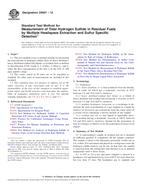
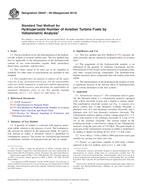 ASTM D6447-09(2014)..
ASTM D6447-09(2014)..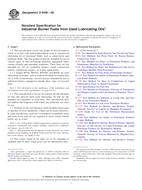 ASTM D6448-09
ASTM D6448-09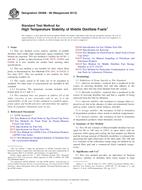 ASTM D6468-08(2013)..
ASTM D6468-08(2013)..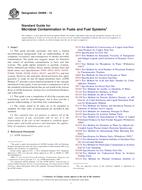 ASTM D6469-12
ASTM D6469-12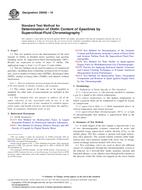 ASTM D6550-10
ASTM D6550-10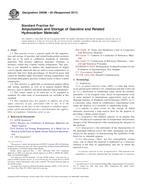 ASTM D6596-00(2011)..
ASTM D6596-00(2011)..
 Cookies
Cookies
